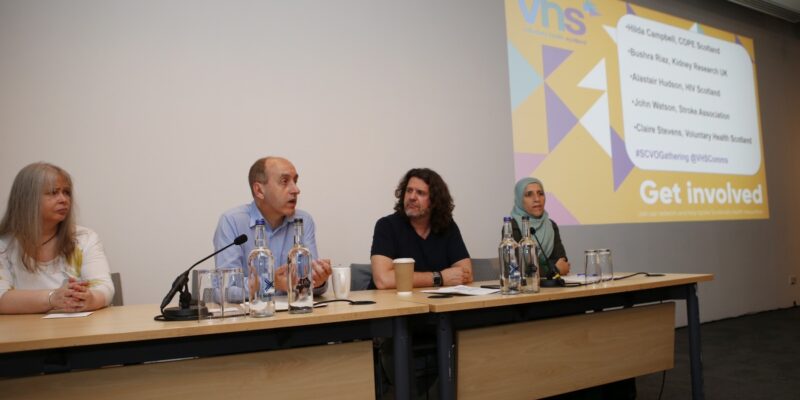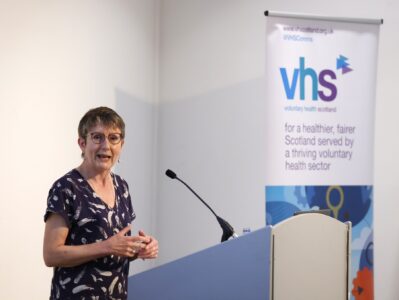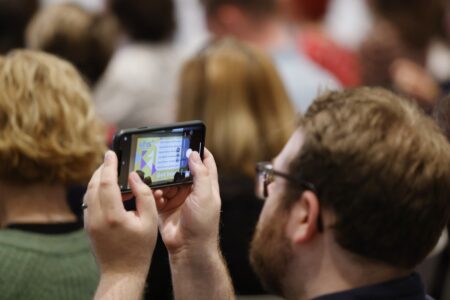
The Gathering – Wednesday 15th June 2022
Chaired by Claire Stevens, CEO, Voluntary Health Scotland. Members of the panel:
- Hilda Campbell, CEO, COPE Scotland
- Bushra Riaz, Policy Officer, Kidney Research UK
- Alastair Hudson, CEO, HIV Scotland
- John Watson, Associate Director Scotland, Stroke Association
We were joined by 100 attendees at Voluntary Health Scotland’s event as part of The Gathering. Claire Stevens opened the conversation by explaining health inequalities were the unjust and avoidable differences in people’s health across the population and between different groups. The discussion focused on health inequalities, the right to health and the need for more inclusive healthcare. The panel drew on their experience on a diverse mix of conditions but many of the challenges raised were felt across the board.
HIV Scotland: Alastair Hudson was optimistic about where we were with prevention and treatment for HIV. Throughout the session he highlighted the importance of getting our language right when we are talking about HIV, inequalities and stigma. He felt there was no reason why Scotland couldn’t be a global leader and noted a review of the Sexual Health and Blood Borne Virus Framework was coming down the tracks.
Kidney Research UK: Bushra Riaz highlighted there were 3.5 million people in the UK with kidney disease and many were unaware until they experienced renal failure. She outlined Kidney Research UK’s Peer Educator project amongst the South Asian (Sikh, Hindu and Muslim) communities of Glasgow, Edinburgh and surrounding areas. The peer educators were volunteers from the community who visit community settings to raise awareness of kidney disease, living donation, organ and tissue donation. This project provides education and resources through communities, often with faith partners, to tackle health inequalities experienced by these communities.
Stroke Association: We heard from John Watson that stroke was the fourth biggest cause of death and the biggest cause of disability in the UK. He added that the burden of stroke largely fell on the most disadvantaged groups. John advocated for a proactive and targeted approach to identifying risk factors such as diabetes. He underlined the role poverty played in driving health inequalities, which was a recurring theme throughout the session.
COPE Scotland: Hilda Campbell provided a stark overview of the situation on the ground in communities, underlining how challenging the pandemic had been for so many people. She reminded us how trapped people felt during lockdowns and how this had retraumatised many people struggling with their mental health. She felt the focus needed to be on tackling the underlying causes of health inequalities and providing people with a decent standard of living. She stressed the need to create a more equal society and communities with resilience, endurance and hope.
The event opened up to a wider conversation with the audience:
Limited Resources: In response to the warning from the First Minister earlier that day about the 5% real terms cut in public expenditure, Hilda felt this emphasised the need for collaboration more than ever due to the limited resources. She explained the role “network weaving” could play in harnessing collaboration. John put simply that prevention was cheaper than cure and Alastair spoke about treatment as prevention. Alastair highlighted that HIV Scotland was working with the Scottish Government to develop a postal testing service.
Care: Richard Meade, Carers Scotland, spoke about the health inequalities carers experienced and raised significant concerns about the potential increase in the burden of care as public funding was reduced. Hilda echoed this concern, noting unpaid care and third sector support went off the Richter scale during the pandemic.
 Community Solutions: Recognising that health issues don’t happen in isolation, David Stewart highlighted FEDCAP Scotland provided employability support through health. He felt everyone in the room understood health inequalities but asked how we now shift the conversation towards action and solutions. Claire drew attention to the Scottish Parliament’s health inequalities inquiry and underlined the need for a community asset based approach to solutions. Hilda said we needed locality plans which identified the gaps in provision and worked with partners to fill them. She made the case for individual approaches for individual communities and urged us to share power with communities. Alastair felt community research with academic partners should be nurtured and Bushra agreed that reaching out to communities was key. She added “one shoe did not fit all”. Claire underlined the importance of demonstrating action after engaging with people about their lived experience, explaining it can be extremely challenging to relive an experience and this must be valued.
Community Solutions: Recognising that health issues don’t happen in isolation, David Stewart highlighted FEDCAP Scotland provided employability support through health. He felt everyone in the room understood health inequalities but asked how we now shift the conversation towards action and solutions. Claire drew attention to the Scottish Parliament’s health inequalities inquiry and underlined the need for a community asset based approach to solutions. Hilda said we needed locality plans which identified the gaps in provision and worked with partners to fill them. She made the case for individual approaches for individual communities and urged us to share power with communities. Alastair felt community research with academic partners should be nurtured and Bushra agreed that reaching out to communities was key. She added “one shoe did not fit all”. Claire underlined the importance of demonstrating action after engaging with people about their lived experience, explaining it can be extremely challenging to relive an experience and this must be valued.
The event underlined the need for collaboration to tackle health inequalities within the limited resources we have. The role of poverty in driving health inequalities cannot be overstated and we need to see a significant shift towards prevention based approaches. We must work to develop solutions in partnership with communities and ensure that we truly value people’s lived experience. There was a recognition that we “in the room” know what the problem is and now was the time for action.
For more information please contact Kimberley Somerside, Policy & Engagement Lead.
